Thanks to supporters like you, we were able to help Mya and her family during a very difficult time.
Eight-year-old Ne’Mya spent so much time in the hospital during treatment for T-cell leukemia that her mother Nekisha couldn’t work. Nekisha had to be with her daughter. She had to be there for blood transfusions, chemotherapy, and spinal treatments.
Of course, this led to financial challenges. Paying the utilities was difficult. Just filling up the car with gas was a struggle.
The Icla da Silva Foundation was able to support Mya and her family both emotionally and financially.
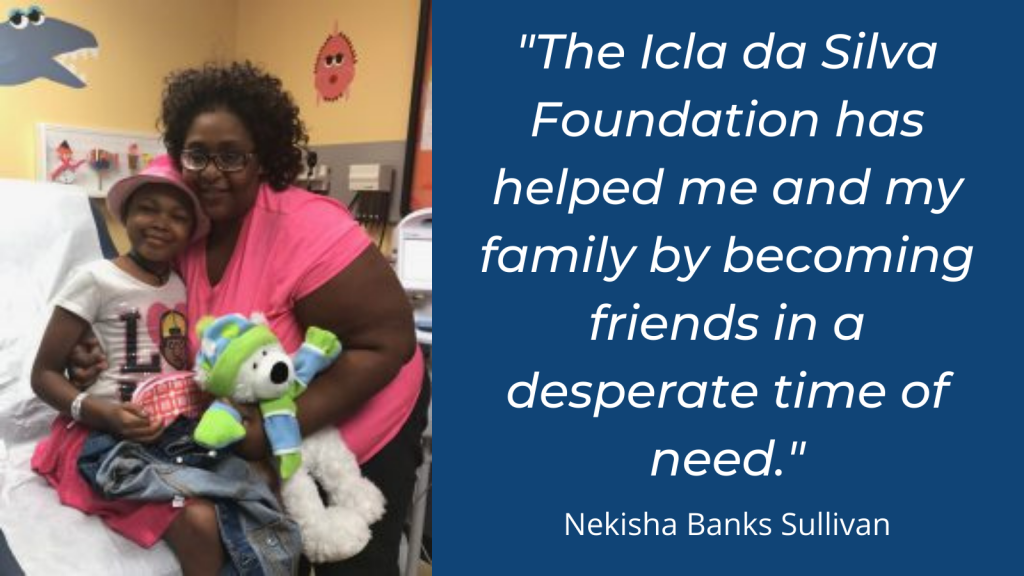
We were able to do this because of you.
Thank you for your support. Thank you for helping us provide a small grant so Mya’s family could focus on her treatment.
Please consider helping us support more patients like Mya.
Help us save more lives.
A Life-Saving Journey from the Dominican Republic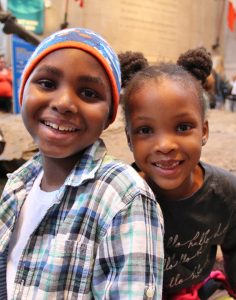
It required a coordinated effort of logistics, financial assistance, and of course emotional support to create this life-saving journey.
You may remember a young patient we worked with named Victor Garcia. At the age of 9, Victor was diagnosed with acute biphenotypic leukemia (BAL), a rare form of leukemia. He was being treated at a hospital in his home country of the Dominican Republic. His doctor determined that the only cure for Victor was a bone marrow transplant from a matching donor.
But there was no matching donor on the registry.
Since siblings represent the best chance for a match, the Icla da Silva Foundation was able to fund HLA testing for his 7-tear-old sister Neyyleyn.
We were happy to find out that Neyyleyn was a 100% match for her brother Victor. But unfortunately, the local hospital did not have the resources to perform the transplant.
Emotional, Logistical, and Financial Support
The Icla da Silva Foundation went into overdrive. We supported Victors’ family and helped coordinate his transplant under a clinical trial at Yale New Haven Teaching Hospital in Connecticut. Our team worked the logistics between the family, the doctors, and the consulates from both countries, assuring that Victor would be able to receive a life-saving transplant.
Thanks to financial support from donors like you, we were also able to fund transportation for the Garcia’s to the United States, while the Ronald McDonald House graciously provided housing.
It took many steps and multiple partners, but a little boy’s life was saved. The Icla da Silva Foundation is both proud and happy to have played a critical role.
Victor is doing well, he is back home in the Dominican Republic; going to school and playing baseball.
You can help us create more life-saving stories like Victors. Please consider a financial contribution to our Icla Cares program.
Written by: Bret Itskowitch
Annual Softball Tournament Swings for ‘A Good Cause’ – NJ.com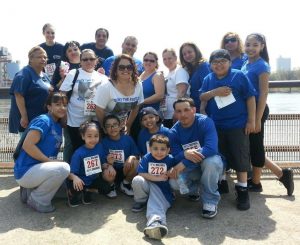 “Back in 2010, “Lil” Ricky Roman was one of 12,000 Americans who needed a bone marrow transplant. Now, nine years later, his family continues to pay it forward.”
“Back in 2010, “Lil” Ricky Roman was one of 12,000 Americans who needed a bone marrow transplant. Now, nine years later, his family continues to pay it forward.”
The Roman family has been holding this tournament every summer for the past 9 years. We are grateful for their continued support.
– Read the story here by by Adrienne Romano | The Jersey Journal
Nada es ImposibleMiguel está celebrando el aniversario de su trasplante de médula ósea … Está celebrando la vida. Él insiste en que “nada es imposible”.
Miguel Oriol Torres López, es de Barranquitas, un pequeño municipio de montaña en el centro de Puerto Rico. Es un ávido ciclista de montaña y se acerca a los 10 años como sobreviviente de trasplante de médula ósea.
Insiste en que su experiencia y su trasplante lo hicieron más fuerte.
Su Médula ósea Dejó de Funcionar
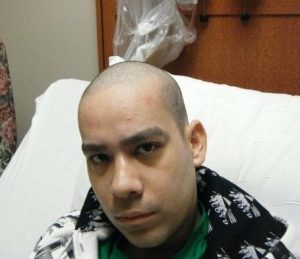 Era el 2007, mientras estudiaba en la Universidad Politécnica en San Juan, cuando Miguel fue diagnosticado y hospitalizado con anemia aplásica. La anemia aplásica es una condición rara y grave. La médula ósea deja de producir suficientes células sanguíneas, lo que deja al paciente cansado y en riesgo de infecciones potencialmente mortales. Afecta la producción de glóbulos rojos y glóbulos blancos, y a las plaquetas.
Era el 2007, mientras estudiaba en la Universidad Politécnica en San Juan, cuando Miguel fue diagnosticado y hospitalizado con anemia aplásica. La anemia aplásica es una condición rara y grave. La médula ósea deja de producir suficientes células sanguíneas, lo que deja al paciente cansado y en riesgo de infecciones potencialmente mortales. Afecta la producción de glóbulos rojos y glóbulos blancos, y a las plaquetas.
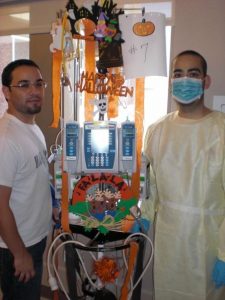 Durante el año siguiente, Miguel recibió tres tratamientos diferentes con la esperanza de estimular su médula ósea en el Hospital Auxilio Mutu en San Juan. También recibió transfusiones semanales de sangre y plaquetas. En septiembre del 2008, estaba combatiendo una infección severa cuando un doctor le dijo a su familia que era posible que no sobreviviría. Su hematólogo, Dr. José A. Lozada lo trasladado por aire a Houston, TX, al MD Anderson Cancer Center, donde estabilizaron su condición y comenzó el proceso para un trasplante de médula ósea.
Durante el año siguiente, Miguel recibió tres tratamientos diferentes con la esperanza de estimular su médula ósea en el Hospital Auxilio Mutu en San Juan. También recibió transfusiones semanales de sangre y plaquetas. En septiembre del 2008, estaba combatiendo una infección severa cuando un doctor le dijo a su familia que era posible que no sobreviviría. Su hematólogo, Dr. José A. Lozada lo trasladado por aire a Houston, TX, al MD Anderson Cancer Center, donde estabilizaron su condición y comenzó el proceso para un trasplante de médula ósea.
Un Trasplante Exitoso de Médula ósea
A pesar de la gravedad de su situación, resulta que Miguel fue muy afortunado. En unos pocos meses, su condición se estabilizó y sucedieron las siguientes cuatro “imposibilidades”:
- Se identificó un donante compatible. (Los pacientes hispanos y latinos solo tienen un 46% de probabilidades de encontrar un donante compatible en el Registro).
- El donante dijo que sí a una donación de médula ósea. (Solo el 37% de los donantes hispanos / latinos dicen sí cuando reciben la llamada).
- Miguel recibió un trasplante de médula ósea para salvarle la vida el 4 de noviembre de 2008.
- 100 días después, su nueva médula ósea comenzó a producir células sanguíneas.
Las probabilidades estaban en contra de Miguel, pero él las venció. Regreso a su ciudad natal en Puerto Rico. Continuó viajando al MD Anderson Cancer Center para chequeos. Después de 2 años en el hospital y con todos los medicamentos y tratamientos de quimioterapia, su cuerpo estaba débil. A través de un amigo, que era un entrenador de spinning, Miguel comenzó a tomar clases de spinning para recuperar las fuerzas. Su amigo también lo presentó a las carreras de bicicleta de montaña.
Después de su Trasplante
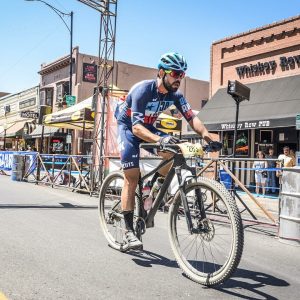 Las carreras de bicicletas eran nuevas para Miguel. Le dio algo que había estado perdiendo después de todo ese tiempo en el hospital: movimiento, libertad y entorno natural. En muy poco tiempo, comenzó a entrenar y conoció a muchos nuevos amigos. También empezó a participar en carreras de bicicleta de montaña de larga distancia. Sus finales de carrera fueron bastante impresionantes:
Las carreras de bicicletas eran nuevas para Miguel. Le dio algo que había estado perdiendo después de todo ese tiempo en el hospital: movimiento, libertad y entorno natural. En muy poco tiempo, comenzó a entrenar y conoció a muchos nuevos amigos. También empezó a participar en carreras de bicicleta de montaña de larga distancia. Sus finales de carrera fueron bastante impresionantes:
- Baja Epic – 2 ° lugar en su grupo de edad
- Prickly Pedal – 2 ° lugar en su grupo de edad
- Festival de bicicleta de montaña de Pisgah – 17 ° en la categoría de hombres abiertos
- Whisky Off Road: top 20 en general
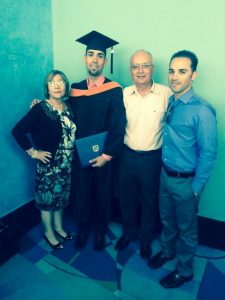 Regresó a la Universidad Politécnica y terminó su carrera de ingeniería eléctrica. Trabaja medio tiempo como ingeniero eléctrico y también trabaja tiempo completo en la farmacia de su padre.
Regresó a la Universidad Politécnica y terminó su carrera de ingeniería eléctrica. Trabaja medio tiempo como ingeniero eléctrico y también trabaja tiempo completo en la farmacia de su padre.
Miguel dice que su trasplante lo hizo más fuerte que antes, tanto mental como físicamente. Él está muy agradecido.
Ayudando a Otros
A medida que Miguel se aproxima al décimo aniversario de su trasplante de médula ósea, quiere involucrarse más en la creación de conocimiento sobre cómo unirte al registro Be The Match. Al contar su historia, quiere motivar a personas que se unan la registro y animar a los pacientes que necesitan un trasplante de médula ósea a que nunca pierdan la esperanza. Un trasplante de médula ósea le salvó la vida. Él insiste en que lo hizo más fuerte que antes, tanto física como mentalmente. “Podemos volver a la normalidad después de un trasplante … puede fortalecernos”.
“Nada es Imposible”
Puedes unirte al registro en apoyo de Miguel haciendo clic en este enlace:
También puedes ayudar a aumentar el conocimiento sobre la importancia sobre unión al registro. Miguel fue muy afortunado. No todos los pacientes logran encontrar un donante compatible. Simplemente no hay suficientes personas registradas para ser donantes potenciales. Puedes cambiar eso uniéndote al registro y difundiendo la palabra. Tú, tus amigos y tus familiares pueden convertirse en salvavidas … nada es imposible.
Para aquellos que no están listos o no pueden unirse al registro, Miguel te recuerda que una pequeña donación ayuda a nuestros esfuerzos para agregar donantes más étnicamente diversos al Registro Be the Match. La Fundación Icla da Silva se concentra especialmente en proporcionar resultados equitativos para los pacientes durante el trasplante, y eso no puede suceder hasta que exista más diversidad en el Registro. Dona en honor de Miguel a:
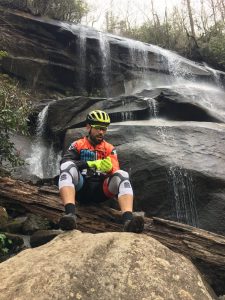 Por favor ayúdanos a compartir la historia de Miguel. Nada es imposible; como Miguel, creemos que más personas se unirán al registro y pacientes que sufren ganarán más esperanza.
Por favor ayúdanos a compartir la historia de Miguel. Nada es imposible; como Miguel, creemos que más personas se unirán al registro y pacientes que sufren ganarán más esperanza.
Miguel is celebrating the anniversary of his bone marrow transplant…Miguel is celebrating life. He insists “nothing is impossible”.
Miguel Oriol Torres Lopez, is from Barranquitas, a small mountain municipality in the center of Puerto Rico. Miquel is currently an avid mountain bike racer, and approaching 10 years as bone marrow transplant survivor.
He insists that his experience, and his transplant, made him stronger than he was before.
His Bone Marrow Stopped Working
 It was 2007, while studying at Universidad Politécnica in San Juan, when Miguel was hospitalized and diagnosed with aplastic anemia. Aplastic anemia is a rare and serious condition. The bone marrow stops producing enough blood cells, leaving the patient feeling fatigued and at risk for life threatening infections. It affects the production of both red and white blood cells, as well as platelets.
It was 2007, while studying at Universidad Politécnica in San Juan, when Miguel was hospitalized and diagnosed with aplastic anemia. Aplastic anemia is a rare and serious condition. The bone marrow stops producing enough blood cells, leaving the patient feeling fatigued and at risk for life threatening infections. It affects the production of both red and white blood cells, as well as platelets.
 During the next year, Miguel received three different treatments in the hopes of stimulating his bone marrow at Hospital Auxilio Mutu in San Juan. He also received weekly blood and platelet transfusions. His body was suffering from infection when in September of 2008, a doctor told his family that he could die within the week. His hematologist, Dr. Jose A. Lozada had him air lifted to Houston, TX to the MD Anderson Cancer Center, where they stabilized his condition and began the process for a bone marrow transplant.
During the next year, Miguel received three different treatments in the hopes of stimulating his bone marrow at Hospital Auxilio Mutu in San Juan. He also received weekly blood and platelet transfusions. His body was suffering from infection when in September of 2008, a doctor told his family that he could die within the week. His hematologist, Dr. Jose A. Lozada had him air lifted to Houston, TX to the MD Anderson Cancer Center, where they stabilized his condition and began the process for a bone marrow transplant.
A Successful Bone Marrow Transplant
Despite the severity of his situation, it turns out Miguel was very fortunate. In a few months time, his condition stabilized, and the following four ‘impossibilities’ happened:
- A matching donor was identified. (Hispanic and Latino patients only have a 46% chance of finding a matching donor on the Registry.)
- The donor said yes to a bone marrow donation. (Only 37% of Hispanic/latino donors say yes when they get the call.)
- Miguel received a life-saving bone marrow transplant on November 4, 2008.
- 100 days later, his new bone marrow began producing blood cells.
The odds were stacked against Miguel, but he beat them. Miguel moved back to his hometown in Puerto Rico. He continued to travel back to the MD Anderson Cancer Center for check-ups. After 2 years in the hospital, and with all of the medications and chemo treatments, his body was weak. Through a friend, who was a spinning coach, Miguel started taking spinning classes to gain back body strength. His friend also introduced him to mountain bike racing.
After His Transplant
 Bike racing was new for Miguel. It gave him something he had been missing after all of that time in the hospital – movement, freedom and natural surroundings. In a very short time, he met many new friends and began training, entering and placing in long distance mountain bike races. His finishes were quite impressive:
Bike racing was new for Miguel. It gave him something he had been missing after all of that time in the hospital – movement, freedom and natural surroundings. In a very short time, he met many new friends and began training, entering and placing in long distance mountain bike races. His finishes were quite impressive:
- Baja Epic – 2nd place in his age group
- Prickly Pedal – 2nd place in his age group
- Pisgah Mountain Bike festival – 17th in open mens category
- Whiskey Off Road – top 20 overall
He went back to Universidad Politécnica and finished his electrical engineering degree. He works part time in electrical engineering and full time at his father’s pharmacy.
 Miguel says that his transplant made him stronger, both mentally and physically, than before. He is very grateful.
Miguel says that his transplant made him stronger, both mentally and physically, than before. He is very grateful.
Helping Others
As Miguel approaches the 10 year anniversary of his bone marrow transplant, he wants to become more involved in creating awareness about joining the Be The Match registry. By telling his story, he wants to motivate people to join, and encourage patients in need of a bone marrow transplant to never lose hope. A bone marrow transplant saved his life. He insists it made him stronger, both physically and mentally, than he was before. “We can be normal again after a transplant…it can make us stronger.”
“Nothing is Impossible”
You can join the registry in support of Miguel by clicking this link: join the registry
You can also help increase awareness about the importance of joining. Miguel was very fortunate. Not every patient is successful in finding a matching donor. There simply aren’t enough people who have registered to become a potential donor. You can change that by joining the registry and spreading the word. You, your friends and family may become life savers…nothing is impossible.
For those who are unwilling or not able to join the registry, Miguel is reminding them that a small donation helps our efforts to add more ethnically diverse donors to the Be the Match Registry. The Icla da Silva Foundation is especially focused on providing equitable outcomes for patients as they go through transplant, and that can’t happen until there is more diversity in the Registry. Donate in Miguel’s honor at:
 Please help us share Miguel’s story. Nothing is impossible; like Miguel, we believe that more people will join the registry and patients who are suffering will gain more hope.
Please help us share Miguel’s story. Nothing is impossible; like Miguel, we believe that more people will join the registry and patients who are suffering will gain more hope.
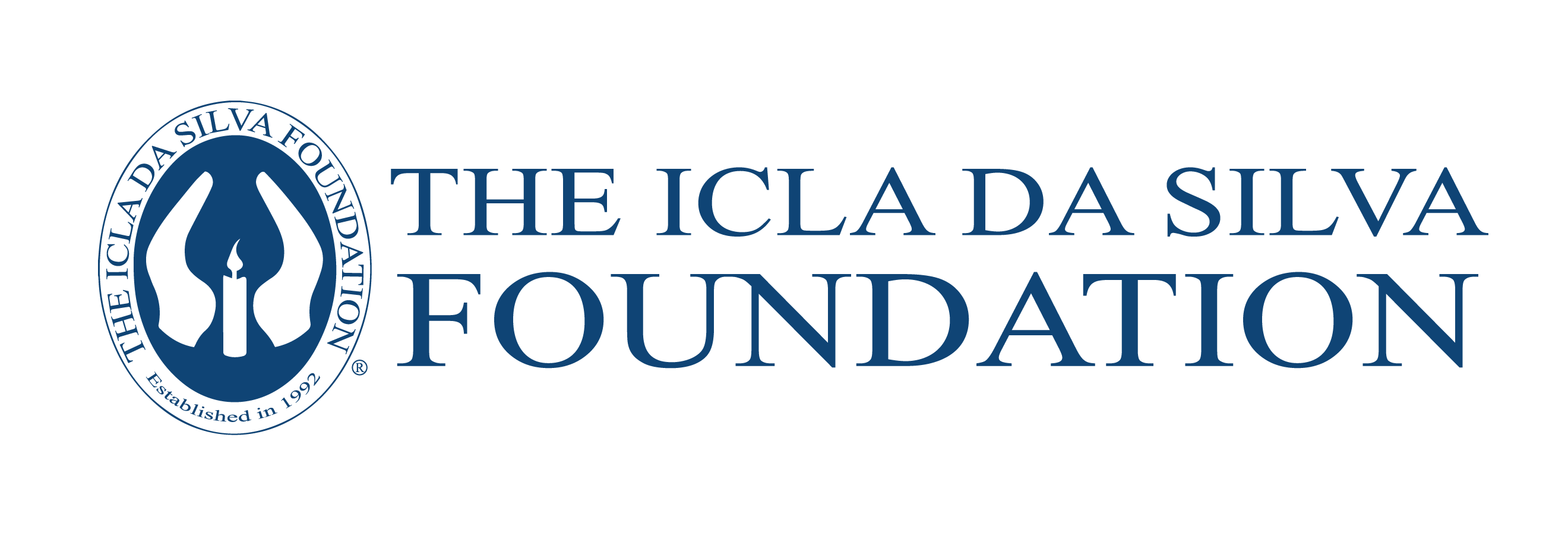
 Inglês
Inglês Espanhol
Espanhol Português
Português